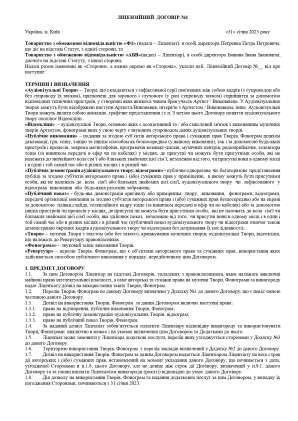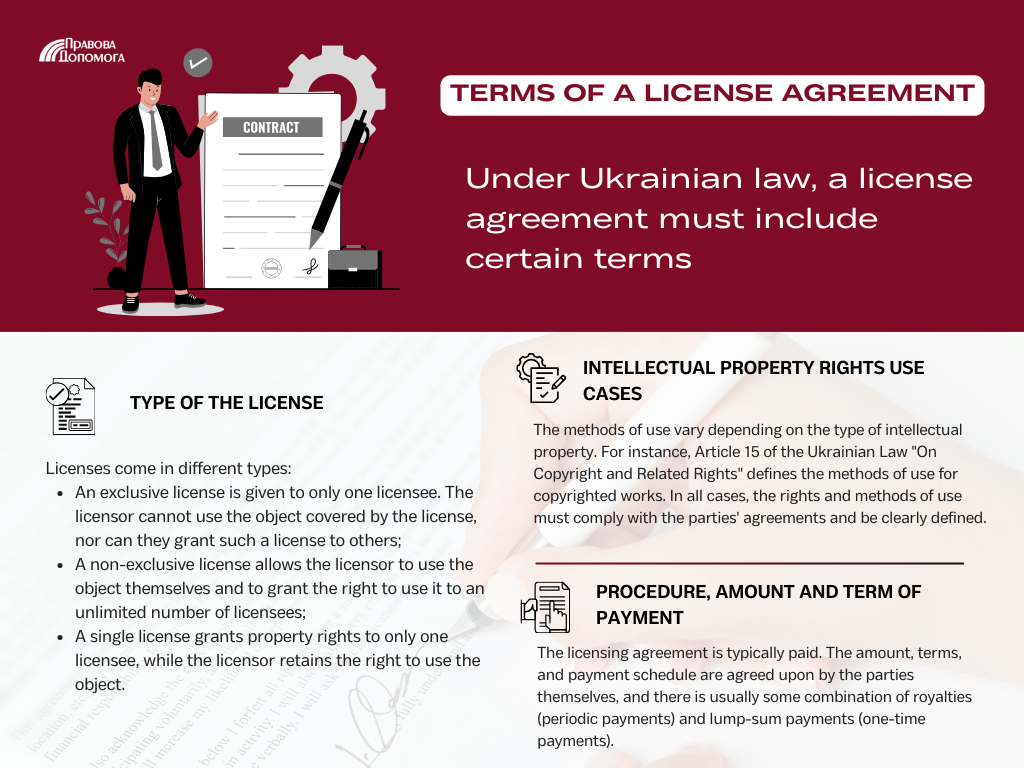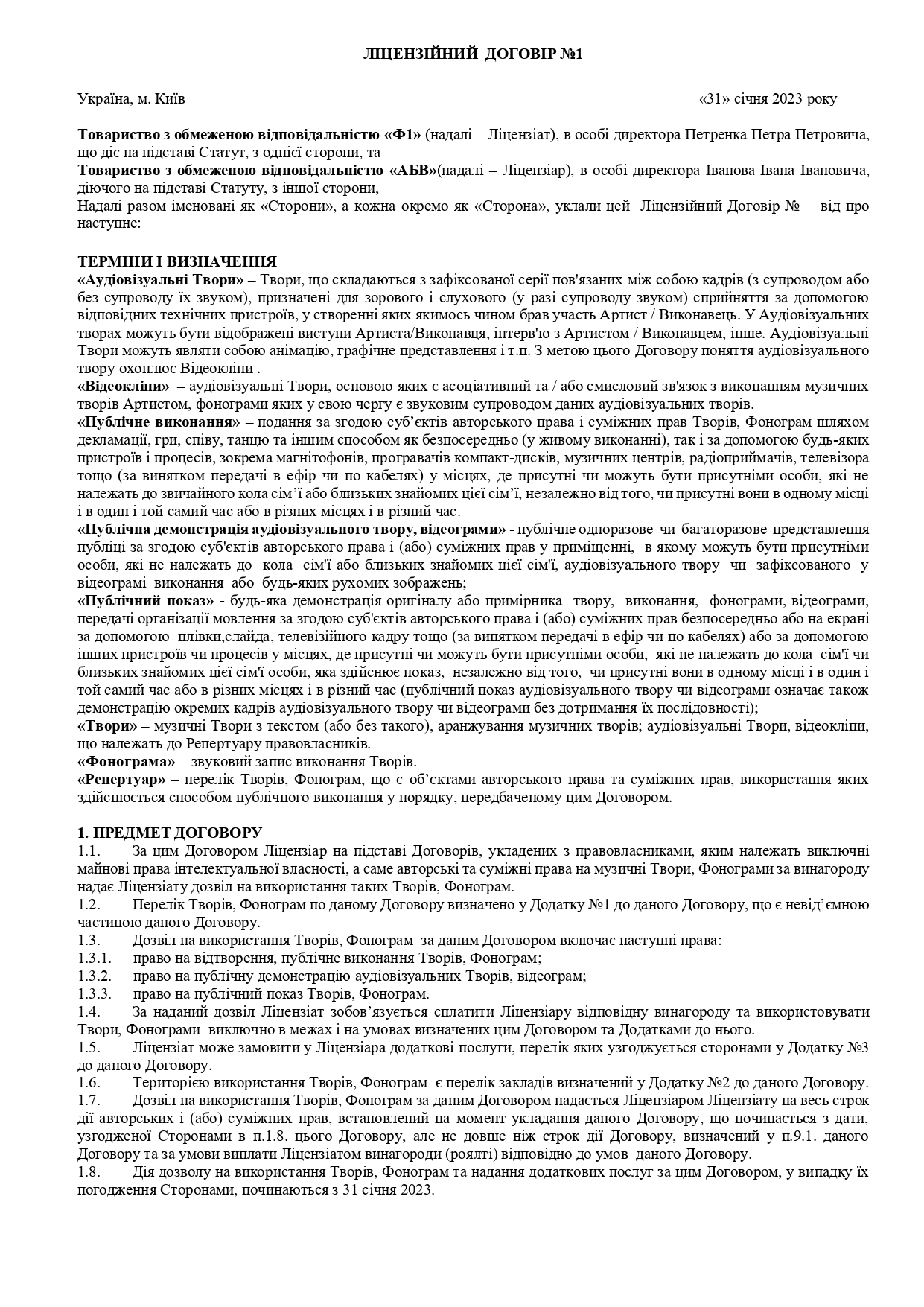License agreement: how to conclude it safely?
Cost of services:
Reviews of our Clients
... our work on joint projects assured us of your high level of professionalism
A license agreement is a contract that governs the use of intellectual property and is signed between the Licensor and the Licensee.
The Licensor is a person or entity that owns property rights to intellectual property or has the right to grant a license to others under certain conditions.
The Licensee, on the other hand, is a person or entity that obtains a license to use intellectual property under the agreement.
Both the Licensor and the Licensee can be individuals or legal entities, including foreign nationals, foreign companies, and representatives, among others.
A license agreement is typically signed when a person or entity that owns the rights to an intellectual property intends to grant the right to use such property to others. For example, every time you install licensed software on your computer, you are accepting the terms of the license for using that software.
The main purpose of a license agreement is to protect the rights of the person or entity that owns the intellectual property. This includes the right to receive compensation for the use of their property.
For the Licensee, the benefit of a license agreement is that it clearly outlines how they can use the intellectual property and helps to avoid any legal claims from other parties. For instance, if you want to use a well-known song in an advertisement, you must obtain permission from the person or entity that owns the property rights to that song. If you use the song without proper authorization, you could face legal action and fines for violating advertising laws. Naturally, such consequences are unacceptable for businesses.
Legal experts often advise entering into a licensing agreement with someone who has property rights or the authority to enter into such an agreement.
A licensing agreement can grant permission to use copyrighted and related works, trademarks, patents, and other objects.
Let's discuss the practical technical and legal aspects of entering into a licensing agreement in Ukraine.
You may also like: Ensuring Transfer of Intellectual Property Rights to Code in Software Development Agreements: Best Practices
Terms of a License Agreement
Under Ukrainian law, a license agreement must include certain terms:
1) Type of the license.
Licenses come in different types:
- An exclusive license is given to only one licensee. The licensor cannot use the object covered by the license, nor can they grant such a license to others;
- A non-exclusive license allows the licensor to use the object themselves and to grant the right to use it to an unlimited number of licensees;
- A single license grants property rights to only one licensee, while the licensor retains the right to use the object.
In practice, the most common type of license is the non-exclusive license, which provides a good balance of rights for both parties. For example, it is often used for music, software, photos, and videos.
A single license is used when the licensor wants to limit the number of licensees and retain control over the property rights. For example, an author may grant a single license to a publisher for the translation and sale of their book while keeping the same right for themselves.
An exclusive license is most beneficial to the licensee, as it grants them the sole right to use the object for a certain period of time. The licensor cannot use the object during this time. This type of license is often used when it is not possible to agree on the sale of property rights, such as in the field of music or architecture.
2) Intellectual Property Rights Use Cases
When it comes to intellectual property, it's important to understand the specific rights granted to licensees and the ways in which they can use these objects.
These property rights may include the exclusive right to use, permission to use, and the ability to prevent illegal use, such as by prohibiting it.
The methods of use vary depending on the type of intellectual property. For instance, Article 15 of the Ukrainian Law "On Copyright and Related Rights" defines the methods of use for copyrighted works, such as public display, public performance, translation, arrangement, adaptation, and more.
Meanwhile, Article 16 of the Ukrainian Law "On the Protection of Rights to Marks for Goods and Services" outlines the methods of use for trademarks, such as using them on products, labels, advertising, and online.
In all cases, the rights and methods of use must comply with the parties' agreements and be clearly defined.
For example, we once helped a subsidiary of a home appliance manufacturer grant its partners the right to create a landing page to promote its products. To ensure the legal use of intellectual property objects, we developed a license agreement that granted a non-exclusive license to use the trademark and other objects of intellectual property. This allowed the licensee to use the objects lawfully while enabling the licensor to monitor the process.
It's also essential to specify the territory and terms of use for these objects.
The territory covered by a licensing agreement is determined by mutual agreement between the parties. However, when it comes to copyrighted works, the territory can cover virtually every country in the world. For trademarks and other forms of intellectual property, which are typically subject to registration, rights can be granted within countries where protection is provided.
The duration of a license is negotiated between the parties and can exceed the term of protection for the intellectual property in question.
For example, the protection of property rights for copyrighted works lasts for 70 years, starting from January 1 of the year following the author's death or the death of the last co-author.
3) Procedure, amount and term of payment
The licensing agreement is typically paid. The amount, terms, and payment schedule are agreed upon by the parties themselves, and there is usually some combination of royalties (periodic payments) and lump-sum payments (one-time payments). However, the legislation does not limit the parties in choosing the payment terms and conditions.
The parties can agree on other conditions in the contract that they consider essential and without which the contract cannot be concluded.
For instance, there may be provisions for early termination of the agreement at the initiative of the licensor if the licensee is involved in a scandal that goes against moral norms.
You may also like: Royalties for the Use of Copyright and Related Rights
The order of use of objects of intellectual property in Ukraine
In Ukraine, when using intellectual property objects that have been granted under a license agreement, it's important to stay within the bounds of the granted rights. If the licensee wants to use the intellectual property in a way that requires additional rights, they should work with the licensor to coordinate this.
For example, if a publishing house wants to publish a book in a foreign language, they'll need to obtain the rights to translate and use that translation, in addition to the right to publish the book.
When entering into a license agreement, it's important to carefully consider how the intellectual property object will be used, in order to ensure that all necessary rights are obtained from the licensor.
In one case, a client provided a license agreement for analysis that assumed the use of the licensor's trademark on the client's product, but did not specify other methods of use. After speaking with the client, we discovered that they planned to use the trademark in an advertising campaign. We worked with the licensor to obtain the additional rights necessary and documented them in the contract.
If the licensee goes beyond the granted rights, the licensor may terminate the contract early and file a lawsuit for damages against the licensee. Therefore, it's important to ensure that all necessary rights are obtained and documented in the license agreement.
When we work on developing or analyzing a licensing agreement for a client, our main goal is to protect the client's interests, minimize risks, and ensure a stable and predictable collaboration under the licensing agreement.
Terminating a licensing agreement and legal disputes
We always make sure that our client is well-protected by the agreement, and that any issues are resolved through negotiation rather than court. Terminating a licensing agreement or getting into legal disputes is not an ideal way for the parties to conduct their relationship.
A licensing agreement, like any other contract, can be terminated in accordance with the law or the agreement, based on a court decision, or for other reasons established by law. Since the law allows the contract to specify grounds for early termination, it's a good idea to take advantage of this and define such grounds in the contract.
For instance, grounds for terminating the agreement may include failure to pay licensing fees or using intellectual property outside of the rights specified in the contract. However, the grounds for termination should be carefully considered. For example, it would be illogical to include a termination clause without the right to sell products that have already been manufactured using a particular trademark.
If the parties are unable to resolve any issues through negotiation and agreement, then the only option remaining is to settle the dispute in court.
Our team of lawyers provides assistance with the development and negotiation of licensing agreements. Our services include:
- Analyzing our clients' interests and goals to determine the best approach for working with a licensing agreement;
- Drafting licensing agreements, negotiating with counterparties, making amendments, and more;
- Providing legal advice on tax and other issues related to royalties;
- Protecting our clients' interests in case of disputes over the terms of licensing agreements through pre-trial settlement.
If you would like to know the cost of developing a licensing agreement, you can find it here or ask our specialists.
Our clients








